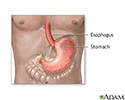Mallory-Weiss tear
Mucosal lacerations - gastroesophageal junction
A Mallory-Weiss tear occurs in the mucus membrane of the lower part of the esophagus or upper part of the stomach, near where they join. The tear may bleed.
Causes
Mallory-Weiss tears are most often caused by forceful or long-term vomiting or coughing. They may also be caused by epileptic convulsions.
Any condition that leads to violent and lengthy bouts of coughing or vomiting can cause these tears.
Symptoms
Symptoms may include:
- Bloody stools
- Vomiting blood (bright red)
Exams and Tests
Tests may include:
- CBC, possibly showing low hematocrit
- Esophagogastroduodenoscopy (EGD), more likely to be done when there is active bleeding
Treatment
The tear usually heals in a few days without treatment. The tear may also be fixed by clips that are put in during an EGD. Surgery is rarely needed. Drugs that suppress stomach acid (proton pump inhibitors or H2 blockers) may be given, but it is not clear if they are helpful.
If blood loss has been great, blood transfusions may be needed. In most cases, bleeding stops without treatment within a few hours.
Outlook (Prognosis)
Repeated bleeding is uncommon and the outcome is most often good. Cirrhosis of the liver and problems with blood clotting make future bleeding episodes more likely to occur.
Possible Complications
Hemorrhage (loss of blood)
When to Contact a Medical Professional
Call your health care provider if you begin vomiting blood or if you pass bloody stools.
Prevention
Treatments to relieve vomiting and coughing may reduce risk. Avoid excessive alcohol use.
References
Falk GW, Katzka DA. Diseases of the esophagus. In: Goldman L, Schafer AI, eds. Goldman-Cecil Medicine. 26th ed. Philadelphia, PA: Elsevier; 2020:chap 129.
Katzka DA. Esophageal disorders caused by medications, trauma, and infection. In: Feldman M, Friedman LS, Brandt LJ, eds. Sleisenger and Fordtran's Gastrointestinal and Liver Disease. 11th ed. Philadelphia, PA: Elsevier; 2021:chap 45.
Digestive system - illustration
Digestive system
illustration
Mallory-Weiss tear - illustration
Mallory-Weiss tear
illustration
Stomach and stomach lining - illustration
Stomach and stomach lining
illustration
Review Date: 10/27/2020
Reviewed By: Michael M. Phillips, MD, Clinical Professor of Medicine, The George Washington University School of Medicine, Washington, DC. Also reviewed by David Zieve, MD, MHA, Medical Director, Brenda Conaway, Editorial Director, and the A.D.A.M. Editorial team.













